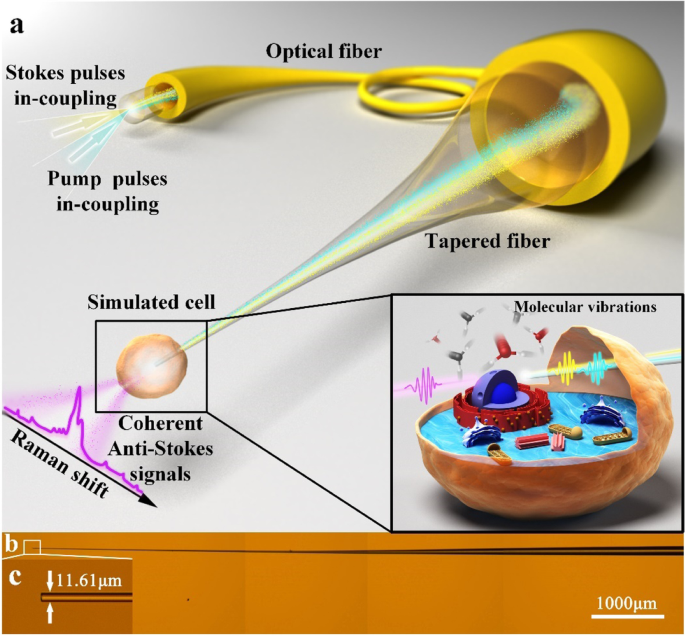Flexible minimally invasive coherent anti-Stokes Raman spectroscopy (CARS) measurement method with tapered optical fiber probe for single-cell application
IF 15.7
Q1 OPTICS
引用次数: 5
Abstract
We proposed and demonstrated a flexible, endoscopic, and minimally invasive coherent anti-Raman Stokes scattering (CARS) measurement method for single-cell application, employing a tapered optical fiber probe. A few-mode fiber (FMF), whose generated four-wave mixing band is out of CARS signals, was selected to fabricate tapered optical fiber probes, deliver CARS excitation pulses, and collect CARS signals. The adiabatic tapered fiber probe with a diameter of 11.61 μm can focus CARS excitation lights without mismatch at the focal point. The measurements for proof-of-concept were made with methanol, ethanol, cyclohexane, and acetone injected into simulated cells. The experimental results show that the tapered optical fiber probe can detect carbon-hydrogen (C–H) bond-rich substances and their concentration. To our best knowledge, this optical fiber probe provides the minimum size among probes for detecting CARS signals. These results pave the way for minimally invasive live-cell detection in the future.

单细胞应用的锥形光纤探头柔性微创相干抗斯托克斯拉曼光谱测量方法
我们提出并演示了一种灵活、内窥镜、微创的单细胞相干反拉曼斯托克斯散射(CARS)测量方法,采用锥形光纤探头。选择产生的四波混频带为CARS信号外的少模光纤(FMF),制作锥形光纤探头,输出CARS激励脉冲,采集CARS信号。采用直径为11.61 μm的绝热锥形光纤探头,可在焦点处对CARS激发光进行无失配聚焦。概念验证的测量是用甲醇、乙醇、环己烷和丙酮注射到模拟细胞中。实验结果表明,锥形光纤探头可以检测出富含碳氢键的物质及其浓度。据我们所知,这种光纤探头在检测CARS信号的探头中提供了最小的尺寸。这些结果为未来微创活细胞检测铺平了道路。
本文章由计算机程序翻译,如有差异,请以英文原文为准。
求助全文
约1分钟内获得全文
求助全文

 求助内容:
求助内容: 应助结果提醒方式:
应助结果提醒方式:


